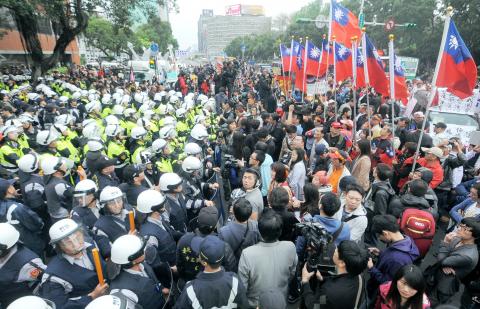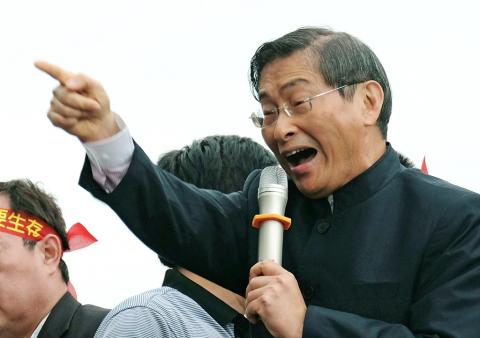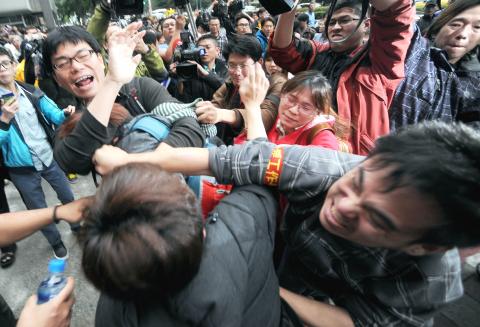Former gang leader Chang An-le (張安樂), who heads the China Unification Promotion Party, led hundreds of people to the streets near the Legislative Yuan in Taipei yesterday to demand that the students who have been “illegally” occupying the legislative chamber “return the legislature.”
Chang, known as the “White Wolf,” said on Monday that he would not take part in yesterday’s counter-protest, but he did not explain his change of heart yesterday.
He said the two main student leaders, Chen Wei-ting (陳為廷) and Lin Fei-fan (林飛帆), were “employed students,” a phrase coined during the Martial Law era to refer to students who worked for the Chinese Nationalist Party (KMT) regime to spy on their peers and report any “unlawful” action against the state.

Photo: Wang Min-wei, Taipei Times
Chen and Lin led hundreds of students in the occupation of the legislative chamber on March 18. The student protesters, who have grown into the Sunflower movement, are demanding that a mechanism to monitor cross-strait talks be established before legislators resume their review of the controversial service trade pact with Beijing.
Accompanied by two student members of the pro-unification New Party — Wang Puchen (王炳忠) and Lin Ming-cheng (林明正) — Chang and his supporters engaged in an hours-long standoff against supporters of the Sunflower movement at one end of Zhengjiang Street, with scores of policemen acting as a buffer between the two sides.
Chang and his group criticized the police for being “blind to the criminal activities” inside the Legislative Yuan, while blocking “law-abiding citizens” from entering the building, “which belongs to everybody.”

Photo: Sam Yeh, AFP
One woman called the students in the legislative chamber “green guards” who were being directed by the Democratic Progressive Party.
At one point, Chang, apparently upset by pro-Sunflower supporters calling him a gangster, angrily shouted: “You are all fucking offspring of Chinese, but you do not deserve to be Chinese. Chinese people do not want you.”
The students responded with applause and laughter, with many shouting: “We are not Chinese anyway. We are Taiwanese.”

Photo: Liu Hsin-de, Taipei Times
Thousands of students supporting the Sunflower movement gathered outside the Legislative Yuan — mostly along Qingdao E Road — to protect those inside.
They responded to Chang and his protesters by singing Island’s Sunrise (島嶼天光), which has become the Sunflower movement’s anthem, and chanting: “Retract the cross-strait service trade agreement” and “Safeguard our democracy.”
Mocking Chang, who allegedly paid for “walkers” to join his demonstration, the students said: “We do not need ‘employed walkers’ to protect democracy.”
Hearing that Chang’s group was asking to meet with student representatives to deliver a petition, Fu Jen Catholic University philosophy professor Shen Ching-kai (沈清楷), who was outside the legislature, said the pro-pact demonstrators were directing themselves at the wrong people.
“Should not those in power be the ones held accountable for people’s complaints?” he said.
Responding from the legislative chamber, Chen said that Chang and his group should be appealing to the Presidential Office, not the anti-pact students.
“The president and the lawmakers are the people who have the real power. The question is not to ask us when are we leaving the Legislative Yuan, but when these people will begin to solve the problem.”
One pro-Sunflower student was hurt after being chased by pro-pact protesters, who threw bottles at him.
Chang’s followers included members of the pro-unification Patriot Association and the Chinese Cross-Strait Women’s League.
His group dispersed after 5pm, but Chang said he would be back.

The US government has signed defense cooperation agreements with Japan and the Philippines to boost the deterrence capabilities of countries in the first island chain, a report by the National Security Bureau (NSB) showed. The main countries on the first island chain include the two nations and Taiwan. The bureau is to present the report at a meeting of the legislature’s Foreign Affairs and National Defense Committee tomorrow. The US military has deployed Typhon missile systems to Japan’s Yamaguchi Prefecture and Zambales province in the Philippines during their joint military exercises. It has also installed NMESIS anti-ship systems in Japan’s Okinawa

TRAGEDY STRIKES TAIPEI: The suspect died after falling off a building after he threw smoke grenades into Taipei Main Station and went on a killing spree in Zhongshan A 27-year-old suspect allegedly threw smoke grenades in Taipei Main Station and then proceeded to Zhongshan MRT Station in a random killing spree that resulted in the death of the suspect and two other civilians, and seven injured, including one in critical condition, as of press time last night. The suspect, identified as a man surnamed Chang Wen (張文), allegedly began the attack at Taipei Main Station, the Taipei Fire Department said, adding that it received a report at 5:24pm that smoke grenades had been thrown in the station. One man in his 50s was rushed to hospital after a cardiac arrest

PUBLIC SAFETY: The premier said that security would be tightened in transport hubs, while President Lai commended the public for their bravery The government is to deploy more police, including rapid response units, in crowded public areas to ensure a swift response to any threats, President William Lai (賴清德) said yesterday after a knife attack killed three people and injured 11 in Taipei the previous day. Lai made the remarks following a briefing by the National Police Agency on the progress of the investigation, saying that the attack underscored the importance of cooperation in public security between the central and local governments. The attack unfolded in the early evening on Friday around Taipei Main Station’s M7 exit and later near the Taipei MRT’s Zhongshan

ON ALERT: Taiwan’s partners would issue warnings if China attempted to use Interpol to target Taiwanese, and the global body has mechanisms to prevent it, an official said China has stationed two to four people specializing in Taiwan affairs at its embassies in several democratic countries to monitor and harass Taiwanese, actions that the host nations would not tolerate, National Security Bureau (NSB) Director-General Tsai Ming-yen (蔡明彥) said yesterday. Tsai made the comments at a meeting of the legislature’s Foreign Affairs and National Defense Committee, which asked him and Minister of National Defense Wellington Koo (顧立雄) to report on potential conflicts in the Taiwan Strait and military preparedness. Democratic Progressive Party (DPP) Legislator Michelle Lin (林楚茵) expressed concern that Beijing has posted personnel from China’s Taiwan Affairs Office to its